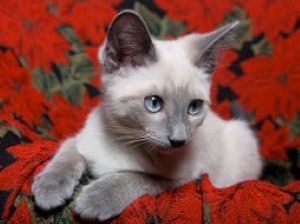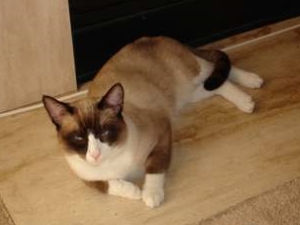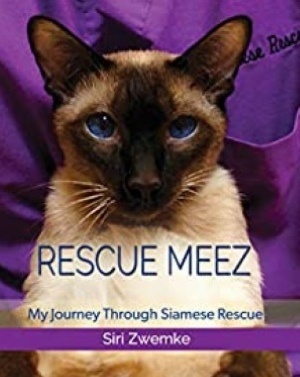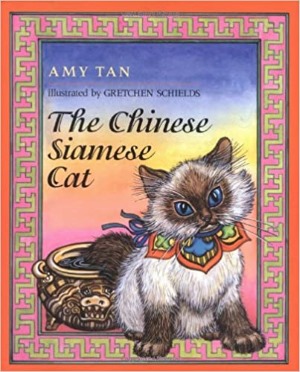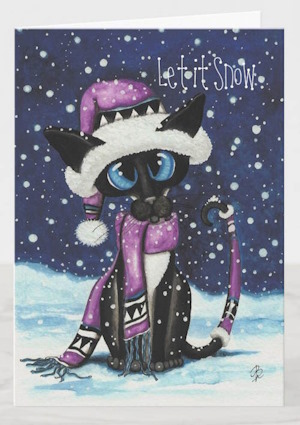- Home
- FAQs. Facts About Cats
- Why Do Cats Purr?
Why Do Cats Purr?
A visiting friend's young son recently asked "why do cats purr?" Everyone knows a purring cat is a happy cat. Don't they? But could there be other reasons for a cat to purr?
Felines are one of only a few species that purrs (others include rabbits, raccoons, lemurs, and even elephants!) but not all types of cats purr.
Cheetahs and servals do, but other big cats (like lions, leopards, and jaguars) only purr when breathing out – they can't purr continuously.
Cats certainly purr when they're happy and relaxed. But a mother cat will purr when giving birth, and they also purr when they're frightened, injured or in pain - or dying. So there must be reasons for purring other than to show contentment.
 Image © iStockphoto | Linda Kloosterhof
Image © iStockphoto | Linda KloosterhofKittens Learn to Purr From Their Mothers
Newborn kittens are blind and deaf, and it's believed that mothers purr to let their kittens know where they are and to tell them to feed. Although the kittens can't hear when they're first born, they can feel their mother's vibrations, which draw the kittens to her.
Kittens learn to purr themselves at around one week old, and it's thought that their purring is a signal back to the mother, letting her know that they're feeding and that all is well.
Purring as a Sign of Friendship
There is a theory that purring could be a sign of friendship, a way for a cat to show that it's in the mood to socialize, or perhaps to communicate that it isn't a threat.
Why Do Cats Purr When They’re Ill? Could It Be Good Vibrations?
Researchers now believe that the vibrations of purring may have a purpose in stimulating self-healing.
Veterinarians have long known that a cat heals more quickly than a dog, and in humans, vibrations have been shown to help relieve pain, and also to stimulate circulation and the growth of new tissue.
One study measured the sound frequencies of cats' purrs and discovered that this happens between 20-200 Hz (and in particular, 25 Hz, 50 Hz, 100 Hz, 125 Hz, and 150 Hz).
The fascinating thing is that these frequencies correspond precisely to those that been shown to help bone growth, pain relief, and the reduction of inflammation in humans.
It's also felt that purring may stimulate the release of endorphins – the morphine-like feel-good chemicals made in the brain. Endorphins are natural pain-relievers so perhaps the main point of purring is to help a cat to recover from injury - to reduce pain and heal itself.
Could It Be a Form of Exercise?
An article in Scientific American written in 2003 speculates that because cats have evolved to save energy (they spend around 17 hours a day resting or sleeping) it may be that purring has evolved to stimulate muscles and bones without movement – a form of passive exercise, perhaps?
Purring Can Be a Request for Food
A recent study by scientists at the University of Sussex demonstrated that purring may be a way for a cat to let its owner know that it's are hungry. ccording to Dr. Karen McComb, who led the team, purring as a request for food is hard to ignore.
This type of purring sounds insistent – urgent, even - and has a meowing, crying sound mixed in with it that owners say is very different to their cats' normal 'happy purr'.
Why Do Cats Stop Purring?
Sometimes, a cat will stop purring as it ages. We don't really know why this happens, but it may just be that it purrs so quietly that you don't hear it. Feel for the vibrations, instead.
If your cat stops purring and seems to be in any pain, have him checked out by a veterinarian, just in case there is anything seriously wrong.
What Does Your Cat’s Purr Mean to You?
It's possible, of course, that we'll never truly find out the answer to 'why do cats purr?' - but it's always fun to speculate.
Whatever the official verdict, most cat owners can interpret their own cats' purring. It's purrrrfectly clear! My cat purrs to say:
- Where have you been?
- I want to go out
- I'm hungry
- Mmm, this snack's good
- I want a cuddle
- I'm happy
- Please rub my tummy
And of Course ...
I love you!
Further Cat Questions
Some of the articles and newsletters on this site may contain links to products I think you may enjoy. If
you purchase through these links I receive a small commission, but there's
no extra cost to you. Find out more on the Affiliates Disclosure page.
Have You Discovered Our Newsletter?
If not, why not? Subscribe to our email newsletter, Meezer Musings, to stay in touch, be the first to see new information and pages as they come out, and read the things we only talk about in the newsletter.
Learn more about it on our Newsletter Sign-Up page.
